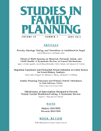
Canadian Studies in Population
Scope & Guideline
Connecting History with Population Insights
Introduction
Aims and Scopes
- Demographic Trends and Patterns:
Investigating significant demographic changes including fertility rates, aging populations, and migration trends, particularly within Canadian provinces and Indigenous populations. - Health and Well-being:
Exploring the interconnections between population dynamics and health outcomes, including studies on maternal and child health, mental health, and the impact of socioeconomic factors on population health. - Socioeconomic Factors:
Analyzing the influence of socioeconomic variables on population issues, such as income disparities, gender wealth gaps, and the intersection of race and health. - Cohabitation and Family Structures:
Examining changes in family dynamics, including cohabitation, marriage trends, and the effects of parental separation on children. - Methodological Advances in Demography:
Promoting innovative methodologies in demographic research, including mathematical modeling and data linkage techniques, to enhance the understanding of population changes.
Trending and Emerging
- Impact of COVID-19 on Demography:
A significant increase in research addressing the effects of COVID-19 on various demographic aspects, such as mortality rates, health disparities, and fertility trends, highlighting the pandemic's profound impact on population studies. - Indigenous Population Studies:
Growing attention on Indigenous populations in Canada, particularly regarding health outcomes and demographic changes, signifies an emerging focus on equity and representation in population research. - Socioeconomic Disparities and Inequality:
An uptick in studies exploring the relationship between socioeconomic status and population health, including gender and racial inequalities, reflects a broader societal concern for equity. - Mental Health and Well-Being:
Increasing emphasis on the mental health outcomes associated with demographic changes, particularly in relation to family structures and community engagement. - Innovative Data Methodologies:
A trend towards utilizing advanced statistical models and data-linkage techniques to derive deeper insights into demographic trends, indicating a methodological evolution in the field.
Declining or Waning
- International Comparisons:
While the journal has previously featured comparative studies between Canada and other nations, such themes have become less frequent, possibly due to a growing emphasis on localized Canadian issues. - Traditional Fertility Studies:
Research focusing solely on fertility without considering broader health or socioeconomic contexts has waned, reflecting a trend towards more integrated approaches. - Historical Demography:
There appears to be a decreasing focus on historical demographic trends, as contemporary issues such as COVID-19 and its implications take precedence.
Similar Journals

Demografie
Illuminating the path of demographic research and policy.Demografie is a distinguished academic journal published by the Cesky Statistical Office in the Czech Republic, serving as a vital platform for scholars and practitioners interested in the multifaceted field of demography. Established in 1976 and consistently contributing until 1999, with a renewed focus from 2014 to 2024, this journal engages with critical issues such as population dynamics, migration patterns, and socio-economic factors influencing demographic changes. For its impactful research contributions, it holds a Q3 category ranking in Demography for 2023, with a Scopus rank of #89 out of 139 in the Social Sciences category, reflecting its credibility and relevance in the field. Although it operates under traditional access, its insightful articles and comprehensive analyses remain valuable resources for researchers, professionals, and students eager to deepen their understanding of demographic trends and policies. The journal's commitment to advancing demographic knowledge makes it an essential read for those navigating the complexities of population studies.

POPULATION RESEARCH AND POLICY REVIEW
Exploring the Dynamics of Population and PolicyPopulation Research and Policy Review is a prestigious journal published by Springer, specializing in the fields of demography and policy analysis. Established in 1982, this journal has developed a significant reputation within the academic community, currently holding a Q1 ranking in Demography and a Q2 ranking in Management, Monitoring, Policy, and Law as of 2023. With a robust Scopus ranking of #34 out of 139 in Demography and a readership that spans multiple disciplines, this journal serves as a critical platform for researchers, professionals, and policymakers to disseminate their findings and insights related to population dynamics and policy implications. Although not an open-access journal, Population Research and Policy Review provides vital research that influences both theoretical frameworks and practical applications in social sciences and environmental management. The journal’s ongoing commitment to high-quality, peer-reviewed scholarship makes it an indispensable resource for those seeking to understand and address contemporary demographic challenges.

JOURNAL OF POPULATION ECONOMICS
Illuminating the Links Between Population Change and Economic GrowthThe JOURNAL OF POPULATION ECONOMICS, published by SPRINGER, stands as a leading peer-reviewed journal in the fields of demography and economics. Established in 1988, this esteemed journal offers a platform for high-quality research that probes the intricate relationships between population dynamics and economic phenomena. With its impressive Q1 quartile ranking in both Demography and Economics and Econometrics for 2023, the journal is recognized as a vital resource for scholars and practitioners alike, reflecting its rigorous standards and impact in the academic community. Its Scopus rankings position it within the top tiers of social sciences, making it an essential read for those engaged in demographic and economic research. Although the journal does not currently adopt an open access model, its esteemed reputation and continuous publication until 2024 ensure relevant and up-to-date findings contribute meaningfully to scholarly discourse. At its core, the JOURNAL OF POPULATION ECONOMICS aims to bridge theoretical insights and empirical findings, fostering an understanding of how population changes influence economic outcomes and vice versa.

STUDIES IN FAMILY PLANNING
Innovating insights in reproductive health and social sciences.STUDIES IN FAMILY PLANNING, published by WILEY, is a renowned journal that serves as a critical resource in the fields of Demography and Social Sciences. With an impressive Q1 ranking in both categories, it is recognized for its high impact and influential contributions to the understanding of family planning dynamics, reproductive health, and population studies. The journal has published scholarly articles since 1970, reflecting its long-standing commitment to advancing knowledge and research in these important areas. Currently holding a rank of #27 out of 139 in Demography on Scopus, the journal's 2023 impact factor underscores its influential role in shaping policy and practice worldwide. Though it operates under a subscription model, it is readily accessible to members of the academic community, including researchers, professionals, and students dedicated to improving family planning systems and socio-demographic studies.

POPULATION AND ENVIRONMENT
Pioneering Research on Population and Environmental InteractionsPopulation and Environment is a renowned journal published by Springer, focusing on the critical intersection between demographic processes and environmental changes. Established in 1980, the journal has become a leading platform for interdisciplinary research, with its impressive impact reflected in its 2023 rankings, placing it in the Q1 quartile for both Demography and Environmental Science (miscellaneous) categories. With Scopus Ranks highlighting its prominent position (#11 out of 139 in Social Sciences – Demography, and #46 out of 219 in Environmental Science), Population and Environment fosters a rich dialogue among researchers, professionals, and students dedicated to understanding how population dynamics influence environmental conditions and vice versa. Operating without an open access option, the journal ensures high standards for scholarly contributions and remains committed to bridging knowledge gaps in the realms of population studies and environmental science. The journal's rigorous peer-review process and comprehensive archive from 1980 to 2024 solidify its reputation as an invaluable resource for advancing research and informing policy in these critical fields.

Journal of Demographic Economics
Transforming Data into Insight for Sustainable DevelopmentThe Journal of Demographic Economics, published by Cambridge University Press, stands as a leading interdisciplinary platform dedicated to the exploration and advancement of research in the intertwined fields of demography, economics, and geography. With an impact factor that reflects its esteemed position—ranking in the Q1 quartile for Demography (2023)—the journal fosters scholarly dialogue through high-quality articles that elucidate the complex interactions between population dynamics and economic trends. Operating under an open access model, the journal ensures that its findings are widely accessible, promoting inclusivity and engagement among researchers, professionals, and students alike. The Journal of Demographic Economics endeavors to bridge gaps in knowledge by publishing innovative and rigorous studies, thereby contributing significantly to both theoretical frameworks and practical applications across various domains. Drawing submissions from a global audience, this journal not only enhances the understanding of demographic transitions but also informs policy decisions and socioeconomic development strategies, making it an essential resource for those invested in demographic and economic research.

Papeles de Poblacion
Connecting diverse perspectives in population dynamics.Papeles de Población, published by the Universidad Autónoma del Estado de México, is a prominent open-access journal that has been advancing the field of demography since its inception in 1997. With an ISSN of 1405-7425, this journal aims to foster a deeper understanding of population studies through research articles, reviews, and critical analyses that address the complex dynamics of demographic changes, social structures, and their implications. While currently ranked in the fourth quartile of its category in 2023, it serves as a significant channel for researchers, professionals, and students to disseminate and access cutting-edge findings. Open access since 2004, it provides a platform for broader readership and knowledge sharing, thus contributing to the global discourse on population issues. Based in Mexico, the journal is committed to embracing diverse perspectives, emphasizing the importance of regional studies within a global context.

GENUS
Innovating the Study of Populations for a Global AudienceGENUS is a prestigious open-access journal published by SpringerNature, dedicated to advancing research in the field of demography. With an E-ISSN of 2035-5556, it has been operating as an open-access platform since 2016, ensuring that valuable demographic knowledge is accessible to a global audience. Located in Switzerland, this journal contributes significantly to the scholarly community, achieving a remarkable Q1 ranking in the 2023 Scopus category for Social Sciences focusing on Demography, where it stands at an impressive Rank #12 out of 139, placing it in the 91st percentile. With a history that spans several decades, starting from 1970 and including comprehensive coverage from 2007 to 2024, GENUS provides a vital forum for researchers, professionals, and students seeking to engage deeply with current demographic studies. This journal not only publishes cutting-edge research but also facilitates fruitful discussions on key demographic trends and policies, making it an essential resource for anyone interested in the social sciences.

Spatial Demography
Transforming Understanding of Demographic TrendsSpatial Demography is a vital academic journal published by Springer International Publishing AG, focusing on the intersection of spatial analysis and demographic research. With its ISSN 2364-2289 and E-ISSN 2164-7070, this journal aims to advance understanding of population dynamics through innovative methodologies and spatially explicit data, offering a platform for researchers, professionals, and students engaged in demography, geography, and urban studies. While it does not currently operate under an open access model, Spatial Demography maintains a rigorous peer-review process to ensure high-quality publications that contribute significantly to the field. Given the growing importance of spatial data in demographic research, the journal serves as an essential resource for those looking to explore how spatial attributes influence demographic processes and patterns worldwide. The official address of the publisher is Gewerbestrasse 11, Cham CH-6330, Switzerland.

POPULATION
Navigating the Landscape of Population DynamicsPopulation, an esteemed journal published by the Institut National d'Études Démographiques (INED), serves as a critical platform for the dissemination of high-quality research in the field of demography. With the ISSN 0032-4663 (Print) and E-ISSN 1957-7966 (Online), this journal covers a wide spectrum of topics related to population studies, including migration, fertility, mortality, and population policy, offering a comprehensive lens on demographic trends that influence societies worldwide. Although it operates under a traditional subscription model, its rigorous peer-review process ensures that only the most impactful and relevant research findings are published. With its long-standing reputation among scholars and practitioners in the demographic domain, Population plays a vital role in shaping the academic discourse and guiding future research directions. Scholars, professionals, and students alike will find in its pages not only innovative perspectives but also critical insights that reflect the complexities of population dynamics in a rapidly changing world. For those dedicated to understanding the demographic challenges that societies face today, this journal remains an invaluable resource.